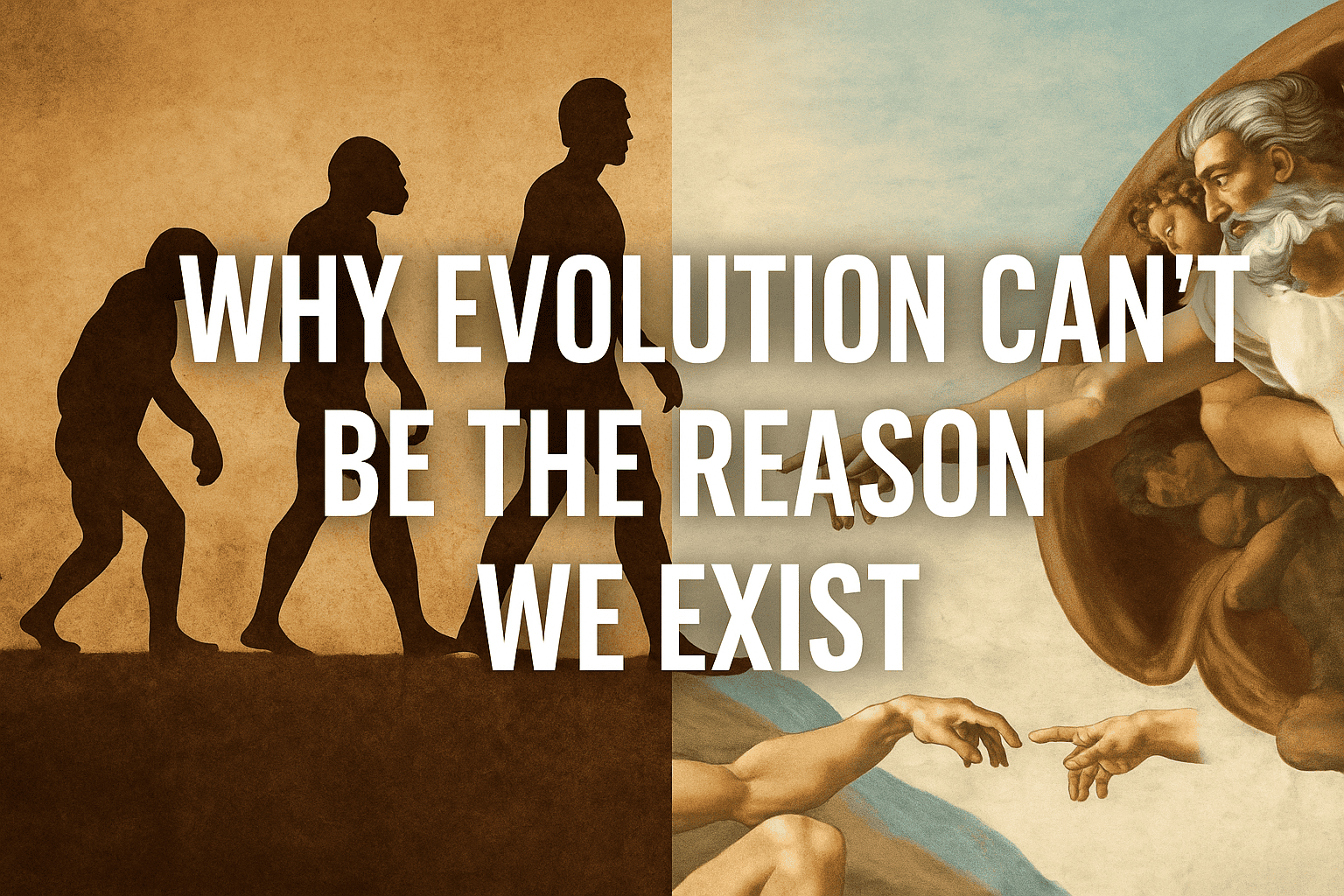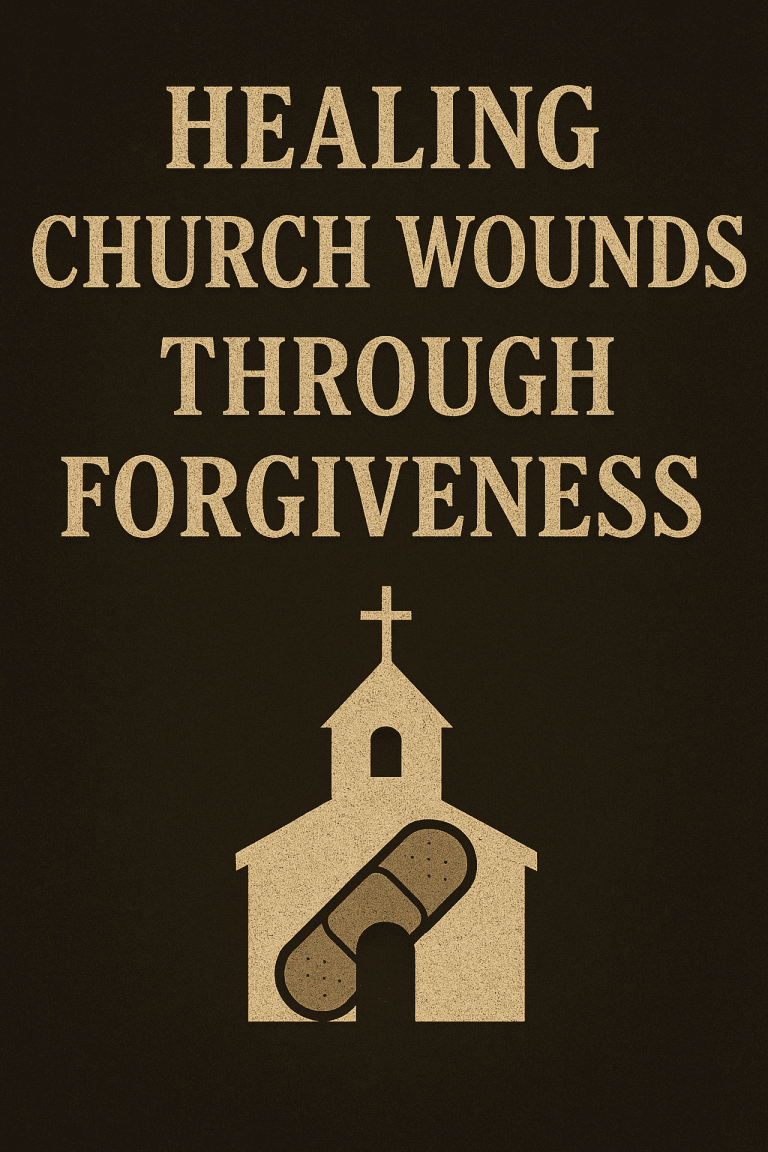Why Evolution Can’t Be the Reason We Exist: A Wake-Up Call for Believers
Why evolution can’t be the reason we exist is a truth too many Christians have abandoned in favor of cultural respectability. But when you trade the voice of God for the theories of man, you lose the only foundation strong enough to explain your worth, your purpose, and your hope. If you’re tired of trying to reconcile Scripture with a system that leaves God out, you’re not alone.

The Pressure to Compromise
For decades, Christians have been pressured to conform. We’ve been told science has settled it, that the Bible’s creation account is outdated, poetic, or merely symbolic.
But behind the polished documentaries and confident textbooks lies a glaring problem: evolution doesn’t explain who you are—or why you’re here. Not really. And no amount of academic jargon can change that.
But the more you study the biblical account—and look at the gaps in evolutionary theory—the more you realize why evolution can’t be the reason we exist, no matter how popular it’s become.
God or Man: Who Tells the Story?
From the very first words of Scripture, God makes it clear. “In the beginning, God created the heavens and the earth” (Genesis 1:1). Not a force. Not a process. A Person. A holy, eternal, intelligent Creator who spoke and it was.
Strip that away, and you’re left trying to explain human dignity, moral conscience, and eternal purpose without a foundation. But that’s exactly what evolutionary theory attempts to do—and why it ultimately fails.
The Gospel Hinges on Creation
Some try to merge the two: theistic evolution, old-earth compromise, or God-guided processes. But if we’re being honest, those are not attempts to honor both Scripture and science. They’re attempts to soften the tension—often by tampering with what God has plainly said.
And let’s be clear: this isn’t just a Genesis issue. It’s a gospel issue.
If Adam wasn’t real, if sin didn’t enter through one man, and if death was always part of creation’s design, then why did Jesus have to die? Romans 5 and 1 Corinthians 15 hinge on creation being historical and literal. Jesus Himself referred to Adam and Eve as real people, not metaphors. Deny that, and the entire storyline of redemption starts to unravel.
Faith and Logic Together
It’s no surprise, then, that why evolution can’t be the reason we exist comes down to authority. Who gets to tell the story—God or man?
Do we believe the One who was there “in the beginning,” or do we reinterpret His words to fit theories built on limited observation and shifting assumptions?
And if that’s true, then why evolution can’t be the reason we exist isn’t a fringe opinion—it’s a necessary conclusion rooted in faith, reason, and Scripture.
Hebrews 11:3 gives us the lens: “By faith we understand that the universe was created by the word of God, so that what is seen was not made out of things that are visible.” That’s not anti-science. That’s God’s perspective.
Science Is Not the Enemy

Here’s what’s beautiful: real science affirms what Scripture has said all along. The fossil record doesn’t show gradual change—it shows sudden appearance and extinction. DNA shouts design.
The complexity of even a single cell makes randomness laughable. And the universe’s fine-tuning is so precise that physicists have to invent concepts like the multiverse to avoid admitting divine intention.
Worship, Not Randomness
This isn’t only about logic. It’s about worship. Colossians 1:16 says, “For by him all things were created… all things were created through him and for him.”
That includes you. You’re not the result of mutation and survival. You were handcrafted by God with intention and care.
That’s why evolution can’t be the reason we exist—because it robs God of His glory and man of his value.
Creation Still Speaks
Romans 1:20 says that God’s invisible attributes—His eternal power and divine nature—have been clearly seen, being understood from what has been made. That means creation itself testifies. It’s not silent. It’s not random. The sky proclaims His handiwork, and even unbelievers are “without excuse.”
We don’t need to twist that truth to sound sophisticated. We need to proclaim it with conviction.
You Can Trust God’s Word
Some of you reading this might be carrying doubts—not because you reject the Bible, but because you’ve been fed a steady diet of half-truths. Maybe a pastor once downplayed Genesis, saying it wasn’t essential. Maybe a college professor rolled his eyes when you mentioned creation. Or maybe your kids or grandkids are being taught to question everything the Bible says about origins.
If that’s you, I want to say this gently but firmly: the Bible doesn’t need to be rescued. It just needs to be believed.
John 1:3 says, “All things were made through him, and without him was not anything made that was made.” That verse doesn’t allow for evolutionary detours. It declares Jesus Christ as the Creator, not just the Savior.
And if we truly believe He made us, then we can also trust that He knows what’s best for us. We don’t have to bow to the culture’s shifting theories to stay relevant. We need to stand on the unshakable truth of God’s Word.
You Are Not an Accident
This isn’t about winning arguments—it’s about reclaiming the foundation. It’s about helping the next generation see that faith isn’t blind and that the Bible speaks clearly. It’s about living with the confidence that we were made by a Creator who loves us, not by a cold, impersonal process.
That’s why evolution can’t be the reason we exist. Because God already told us the reason: “You are mine” (Isaiah 43:1).
Take the Next Step
You weren’t made by accident. You were made by a Creator who formed you with purpose and placed you in this moment to know Him. Stand firm on the truth that the Bible speaks clearly—even when the culture doesn’t.
Want to understand what the Bible really teaches about election?
👉 Download my free pamphlet: Chosen by Grace
A simple, Scripture-focused guide to God’s sovereignty in salvation.
Discover why salvation depends not on man’s will or effort, but on God who has mercy.
Walt Roderick is a Christian writer who cares more about biblical clarity than online applause. He writes to strengthen believers and confront spiritual drift.






